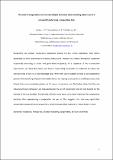The smell of cooperation : rats increase helpful behaviour when receiving odour cues of a conspecific performing a cooperative task
Abstract
Reciprocity can explain cooperative behaviour among non-kin, where individuals help others depending on their experience in previous interactions. Norway rats (Rattus norvegicus) cooperate reciprocally according to direct and generalized reciprocity. In a sequence of four consecutive experiments, we show that odour cues from a cooperating conspecific are sufficient to induce the altruistic help of rats in a food-exchange task. When rats were enabled to help a non-cooperative partner while receiving olfactory information from a rat helping a conspecific in a different room, they helped their non-cooperative partner as if it was a cooperative one. We further show that the cues inducing altruistic behaviour are released during the act of cooperation and do not depend on the identity of the cue provider. Remarkably, olfactory cues seem to be more important for cooperation decisions than experiencing a cooperative act per se. This suggests that rats may signal their cooperation propensity to social partners, which increases their chances to receive help in return.
Citation
Gerber , N , Schweinfurth , M K & Taborsky , M 2020 , ' The smell of cooperation : rats increase helpful behaviour when receiving odour cues of a conspecific performing a cooperative task ' , Proceedings of the Royal Society of London Series B: Biological Sciences , vol. 287 , no. 1939 , 20202327 . https://doi.org/10.1098/rspb.2020.2327
Publication
Proceedings of the Royal Society of London Series B: Biological Sciences
Status
Peer reviewed
ISSN
0962-8452Type
Journal article
Description
Funding was provided by SNF–grant nos. 421 310030B_138660 and 31003A_156152 to M.T.Collections
Items in the St Andrews Research Repository are protected by copyright, with all rights reserved, unless otherwise indicated.

